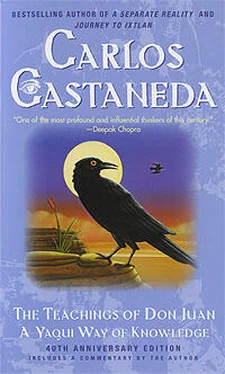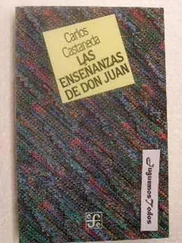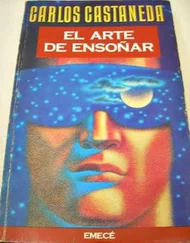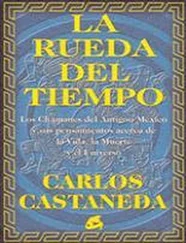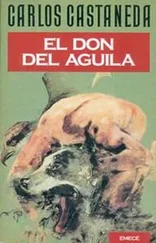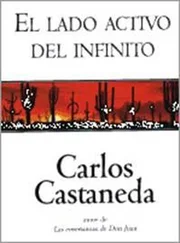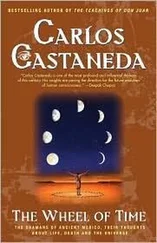'But how did I win?'
'You did not move from your spot. Had you moved one inch away you would have been demolished. She chose the moment I was away as the best time to strike, and she did it well. She failed because she did not count on your own nature, which is violent, and also because you did not budge from the spot on which you are invincible.'
'How would she have killed me if I had moved?'
'She would have hit you like a thunderbolt. But above all she would have kept your soul and you would have wasted away.'
'What is going to happen now, don Juan?'
'Nothing. You won your soul back. It was a good battle. You learned many things last night.'
Afterwards we began to look for the stone I had hurled. He said if we could find it we could be absolutely sure the affair had ended. We looked for nearly three hours. I had the feeling I would recognize it. But I could not.
That same day in the early evening don Juan took me into the hills around his house. There he gave me long and detailed instructions on specific fighting procedures. At one moment in the course of repeating certain prescribed steps I found myself alone. I had run up a slope and was out of breath. I was perspiring freely, and yet I was cold. I called don Juan several times, but he did not answer, and I began to experience a strange apprehension. I heard a rustling in the underbrush as if someone was coming towards me. I listened attentively, but the noise stopped. Then it came again, louder and closer. At that moment it occurred to me that the events of the preceding night were going to be repeated. In a matter of a few seconds my fear grew out of all proportion. The rustle in the underbrush got closer, and my strength waned. I wanted to scream or weep, run away or faint. My knees sagged; I fell to the ground, whining. I could not even close my eyes. After that, I remember only that don Juan made a fire and rubbed the contracted muscles of my arms and legs.
I remained in a state of profound distress for several hours. Afterwards don Juan explained my disproportionate reaction as a common occurrence. I said I could not figure out logically what had caused my panic, and he replied that it was not the fear of dying, but rather the fear of losing my soul, a fear common among men who do not have unbending intent.
That experience was the last of don Juan's teachings. Ever since that time I have refrained from seeking his lessons. And, although don Juan has not changed his benefactor's attitude towards me, I do believe that I have succumbed to the first enemy of a man of knowledge.
Part Two
A Structural Analysis
The following structural scheme, abstracted from the data on the states of non-ordinary reality presented in the foregoing part of this work, is conceived as an attempt to disclose the internal cohesion and the cogency of don Juan's teachings. The structure, as I assess it, is composed of four concepts which are the main units: (1) man of knowledge; (2) a man of knowledge had an ally; (3) an ally had a rule; and (4) the rule was corroborated by special consensus. These four units are in turn composed of a number of subsidiary ideas; thus the total structure comprises all the meaningful concepts that were presented until the time I discontinued the apprenticeship. In a sense, these units represent successive levels of analysis, each level modifying the preceding one.*
Because this conceptual structure is completely dependent on the meaning of all its units, the following clarification seems to be pertinent at this point: Throughout this entire work, meaning has been rendered as I understood it. The component concepts of don Juan's knowledge as I have presented them here could not be the exact duplicate of what he said himself. In spite of all the effort I have put forth to render these concepts as faithfully as possible, their meaning has been deflected by my own attempts to classify them. The arrangement of the four main units of this structural scheme is, however, a logical sequence which appears to be free from the influence of extraneous classificatory devices of my own. But, insofar as the component ideas of each main unit are concerned, it has been impossible to discard my
*For outline of the units of my structural analysis, see Appendix B.
personal influence. At certain points extraneous classificatory items are necessary in order to render the phenomena understandable. And, if such a task was to be accomplished here, it had to be done by zigzagging back and forth from the alleged meanings and classificatory scheme of the teacher to the meanings and classificatory devices of the apprentice.
The First Unit
Man of knowledge
At a very early stage of my apprenticeship, don Juan made the statement that the goal of his teachings was 'to show how to become a man of knowledge'. I use that statement as a point of departure. It is obvious that to become a man of knowledge was an operational goal. And it is also obvious that every part of don Juan's orderly teachings was geared to fulfill that goal in one way or another. My line of reasoning here is that under the circumstances 'man of knowledge', being an operational goal, must have bean indispensable to explaining some 'operative order'. Then, it is justifiable to conclude that, in order to understand that operative order, one has to understand its objective: man of knowledge.
After having established 'man of knowledge' as the first structural unit, it was possible for me to arrange with assurance the following seven concepts as its proper components: (1) to become a man of knowledge was a matter of learning; (2) a man of knowledge had unbending intent; (3) a man of knowledge had clarity of mind; (4) to become a man of knowledge was a matter of strenuous labour; (5) a man of knowledge was a warrior; (6) to become a man of knowledge was an unceasing process; and (7) a man of knowledge had an ally.
These seven concepts were themes. They ran through the teachings, determining the character of don Juan's entire knowledge. Inasmuch as the operational goal of his teachings was to produce a man of knowledge, everything he taught was imbued with the specific characteristics of each of the seven themes. Together they construed the concept 'man of knowledge' as a way of conducting oneself, a way of behaving that was the end result of a long and hazardous training. 'Man of knowledge', however, was not a guide to behaviour, but a set of principles encompassing all the un-ordinary circumstances pertinent to the knowledge being taught.
Each one of the seven themes was composed, in turn, of various other concepts, which covered their different facets.
From don Juan's statements it was possible to assume that a man of knowledge could be a diablero, that is, a black sorcerer. He stated that his teacher was a diablero and so was he in the past, although he had ceased to be concerned with certain aspects of the practice of sorcery. Since the goal of his teaching was to show how to become a man of knowledge, and since his knowledge consisted of being a diablero, there may have been an inherent connexion between man of knowledge and diablero. Although don Juan never used the two terms interchangeably, the likelihood that they were connected raised the possibility that 'man of knowledge' with its seven themes and their component concepts covered, theoretically, all the circumstances that might have arisen in the course of becoming a diablero.
To become a man of knowledge was a matter of learning The first theme made it implicit that learning was the only possible way of becoming a man of knowledge, and that in turn implied the act of making a resolute effort to achieve an end. To become a man of knowledge was the end result of a process, as opposed to an immediate acquisition through an act of grace or through bestowal by supernatural powers. The plausibility of learning how to become a man of knowledge warranted the existence of a system for teaching one how to accomplish it.
Читать дальше
